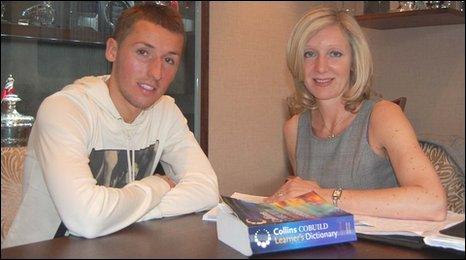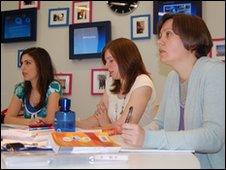Pitch perfect: Learning languages to boost careers
- Published

Forest footballer Raddy Majewski is studying English with tutor Liz Nathan
"Sometimes I dream in English. Once my girlfriend asked me what I was talking about in my sleep and it turned out I was talking aloud in English."
Flanked by cabinets stuffed with trophies and silverware, Polish international midfielder, Radoslaw 'Raddy' Majewski, is learning English in the City Ground boardroom with tutor Liz Nathan.
He has just signed a three year contract with Nottingham Forest Football Club after months of speculation.
Mr Majewski arrived at the club a year ago on loan from Polonia Warsaw. Since then, Nottingham Forest has been paying for him to learn the language.
He studied English at school but says it did not prepare him for coming and working in the country.
"Liz and I have a joke between us. In the beginning she asked me 'how do you feel today?' and I said 'three weeks ago'," he laughs.

Raddy Majewski has just signed a three year contract with Nottingham Forest
"For the first two months I couldn't speak to anyone. Many of the lads were speaking in slang but I didn't understand the slang. I probably still don't."
He thinks his English has greatly improved and has made his working life much easier.
"On the pitch I can explain what I want and my team-mate can tell me what he wants and I can understand him. Now I don't have to think too much about an answer - its automatic."
Ms Nathan has been teaching Mr Majewski how to handle all aspects of his job, including how to cope with post-match questions from the media.
"We've set targets for him to be able to speak to the manager, his team-mates and to understand half-time briefings," says Ms Nathan.
"When he first came his understanding was very weak, but now he's speaking English with increasing confidence."
Business needs
On a chilly spring morning at the headquarters of O2 in Slough, a group of employees from commercial finance and marketing are learning how to book a doctors appointment in Spanish.

O2 is paying for some of its employees to learn Spanish
One of the students, 26-year-old Emma Howard, had her last experience of language learning while studying GCSE French.
"I always wanted to learn a language before I started working here, but I didn't think that any company would offer it as part of work development," she says.
O2 has been paying for staff to learn Spanish since it agreed a takeover offer from Spanish telecom company Telefonica in 2005.
"There's a sense that a little goes a long way," says Toby Foggo who is head of talent development for Telefonica O2 UK.
"My Spanish and international colleagues tell me that it really oils the wheels if you can demonstrate that you've made the effort to understand their language and have a basic conversation."
Another student, Natalie Warner, says the language lessons will come in useful for her everyday work.
"I used to make daily cash calls to our offices in Spain. At the start I'd just be speaking English but later on I could start to speak to them in Spanish so learning the language is useful."
Currently, 200 members of staff are learning the language out of a total UK workforce of 12,000.
"We're a business so of course we can't offer everybody the opportunity to learn whatever they like, but we do certainly encourage learning associated with the business," says Mr Foggo.
Confidence
The tutors at Nottingham Forest and O2 are employed by a company called Commercial Language Training.

Jane Weightman set up her language training company in 1989
"I always think that the Government should look to language providers to see what the trends are, economically speaking," says Jane Weightman who is the company's director.
When she set up the business in 1989, German was the language everyone wanted to learn.
"We've found that Spanish is becoming increasingly popular now, not only because of the acquisitions of some UK companies by Spanish firms, but also due to the growing automotive industry in South America," she says.
Ms Weightman, a language graduate who gained work experience in the steel and aviation industries, says she saw a gap in the market with no-one providing bespoke business language training aimed at companies.
At any one time she has more than 100 tutors teaching 20 different languages, including Japanese, Arabic and Swedish. The business works with clients as diverse as Manchester City Football Club, AstraZeneca, Microsoft, and The Royal Bank of Scotland.
"People used to say the English were arrogant about learning foreign languages, but I think it's more of a confidence thing," she says.
"They worry they're making a fool of themselves, and that's just silly."
'Higher earners'
Evidence suggests companies are often more willing to employ candidates who already have language skills and then train them to do the job, rather than the other way round.
"There is an increasing need for language competence in companies across the UK, but a lot of companies are employing people from abroad. This will leave a lot of UK people disadvantaged," says Pauline Swanton, past president of the Association for Language Learning.
"Large companies have the money to pay for language training but we've seen that the trend in the last few years has been for smaller companies to expect their employees to improve their skills at their own cost," she says.
A recent poll of 500 companies, conducted for CILT, the National Centre for Languages, revealed that one in four said the ability to speak a second language would give a candidate the edge when applying for a job.
And employers ranked foreign language skills as second only to IT when it comes to finding the right candidate.
The survey also revealed that the average wage of language graduates three years after leaving university is ahead of that of graduates in engineering, maths, physics and chemistry.
'Improve employability'
Earlier this year, more than 300 firms including Arsenal Football Club, HSBC and British Airways, signed up to the Business Language Champions programme, launched by CILT and sponsored by the Department for Children, Schools and Families.
The scheme urges UK businesses to sign up with schools to help demonstrate to young people just how valuable language skills can be in the workplace.
Foreign language learning became non-compulsory for secondary school pupils in 2004.
"By making language learning at school optional after 14, teenagers at the very early stages of their career-planning are not armed with the best information as to how languages can help them in the future," says Teresa Tinsley, director of communications for CILT.
"People's attitudes to language learning seem to change with age. As they experience the world, they find themselves in a better position to see the benefits," she says.
Language providers, teachers, policy makers and industry representatives need to find a way of coming up with ways to encourage people to see how language skills can improve careers, whatever age they are, according to Ms Tinsley.
"At the moment funding from government for adult learners isn't working for the benefit of language learners. Priority funding is placed on vocational training designed to up-skill people for work. At the moment language learning fails to fall into this category," she says.
"The language community might not be making the point that languages can improve employability as strongly as it could be."